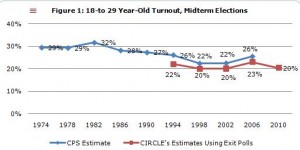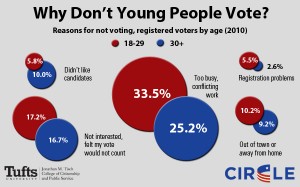Too Turned Off To Turn Out: Hudson Valley’s Lack of Political Involvement

Editor-in-Chief
With elections only a month away, the lack of political activity on campus of Hudson Valley is glaring. Low political involvement plagues young adults everywhere, and is illustrated on our campus by the lack of political clubs.
Just down the road, at SUNY Albany, the College Democrats played a huge role in helping Cecilia Tkaczyk win a close New York State Senate race in 2012. They were awarded national chapter of the year for their efforts. UAlbany’s chapter of Young Americans for Liberty has also been awarded as a top chapter nationwide.
Living in the Capital Region, surrounded by government, the environment is great for a strong civic culture. But for many reasons, the student population at Hudson Valley has been unable or unwilling to organize for any political action.
Time constraints are one reason for lack of political involvement. Second year Hudson Valley Computer Science major Deven Swiergiel is interested in politics but is constrained by time. “It is important,” he said. “I watch progressive news but I don’t have time to do anything but watch. If I wanted to get active, it would be just be too difficult with my schedule.”
Another reason is that there is an information overload that makes it hard for students to decide what type of politics to advocate for. “To be honest, I am [interested], but I just haven’t signed up for voting right now,” said Kellie Bush, nursing student. “My parents are both different so I haven’t decided what to become yet. So it’s difficult,” she said.
Finally, students are too turned off by the dysfunction of our political system to care. Toni Lopresti, individual studies student, said, “Honestly I think it all sucks.”
Meanwhile, the numbers show that the student body at Hudson Valley could make an impact.
Kathy Sheehan won the Albany Mayoral primary last year with 7,468 votes. In the only local State Senate Primary this year, Madelyn Thorne won with 4,273 votes.
In comparison, Hudson Valley has over 12,000 students, which is more than the 11,741 combined votes received in these two recent high-profile Capital Region elections.
This shows that a relatively small number of people can play a pivotal role in local elections. The aforementioned Senator Tkaczyk is up for reelection this year against the same opponent as last time, with the result having major implications for whether the state senate is controlled by Democrats or Republicans.
Unfortunately, fewer than one in five individuals under 30 years old (which makes up the majority of the student population) vote in local elections. The potential for young adults to decide elections, and through them government policy, is mostly wasted.
College students have played a major role in bringing positive change in the past. Most notable are the student protests of the 1960s against the Vietnam War.
Student Activities Director Louis Coplin believes that Hudson Valley could benefit from having political organizations on campus. According to Coplin, the Student Senate and Hudsonian act as the two most political clubs on campus. Neither, though, have a primary mission that is geared toward creating political change off campus.
“There sure is a hell of a lot of stuff going on that would make people want to do something about it. In order to change it we have to become a part of it,” Coplin said, speaking to the Hudsonian.
He believes that a political club could be started at Hudson Valley. “I think there is an interest and a demand for it,” said Coplin, “it just takes someone to take the first step.”
Student Senate President Grace Harrison said, “I think it could make people more aware. I think starting a political science club on campus would be a great thing.”
Thomas Gwinn, a freshman at Hudson Valley, hopes to bring more political involvement to campus by starting a Model United Nations Club. “It definitely would bring an opportunity for students to get involved in global politics and world news. We would be focusing on topics like ISIS and the Ebola outbreak in Africa,” said Gwinn.
Gwinn has been able to find eight students that are interested and is still seeking an advisor so that the club can be chartered and request funding from the Student Senate.
Having clubs that are directly involved in the political process at Hudson Valley could potentially give thousands of people in the Capital Region a chance to have an impact. A student body of over 10,000 could, and should, be able to organize a handful of people.
The results of the recent Scottish vote for independence showed that given a big enough initiative, high involvement can happen. Over 85 percent turned out to vote, which is about 20 percent higher than in American Presidential elections.
Sometimes it takes a game changing initiative, like the prospect of forming a new country to get high levels of involvement. College students are often the ones willing the challenge the status quo and change the game. If the United States is to develop a more dynamic civic culture with high involvement, campuses like Hudson Valley must become active.
“If we start learning how we can solve problems then in the future, if this stuff happens again, we will be prepared,” said Gwinn.

Anger Toward Government Can Spur Positive Action
Grace Harrison
Student Senate President
Guest Contributor
Last year, Student Senate President Grace Harrison researched some of the factors that lead to negative attitudes toward government and low political involvement. These factors included technology, media and unethical politicians. She conducted a series of interviews and attended an event for her paper in addition to citing academic sources. The following is an edited excerpt:
In an effort to explore public action in my own community, I attended a Columbia County board of supervisors airport committee meeting last year. The meeting addressed the proposed expansion of the county airport which would impact many landowners as well as taxpayers in the county.
While attending this meeting I observed, firsthand, the politicians running the meeting had already made up their minds before the meeting had even commenced. During the meeting it became clear that some of the committee were not interested in the concerns of the public. It felt like they had their own undisclosed agenda.
This angered the people and the meeting became heated quickly.
One politician claimed it was best to move the issue to an executive session, excluding the input of the public altogether so the board could make a quick decision. He clearly had an interest in the outcome and was not willing to listen to other points of view.
Prior to this meeting, the public were denied documents regarding the proposed airport expansion plan and were forced to file a FOIL. Even then, the board withheld documents until a lawsuit was filed! Only after six months did the public obtain the requested documents. They felt cheated and dismissed by this group of politicians.
Fortunately, many of the interested citizens who attended this meeting are tenacious individuals who know their rights and are not easily discouraged. Richard Harwood, in his book Hope Unraveled, spoke of these kinds of people as “local heroes”; those with a strong sense of civic duty who do things for the common good and not just their own self interest.
What is it that hinders more individuals from engaging in civil society and following the path of these “local heroes”? A recent study released by Circle, a website connected to Tufts University, found that people felt their participation was unwelcome by institutions and that there was a lack of opportunity to engage.
This negativity slowly eats away at their trust in humanity and promotes their detachment from the public arena.
However, this negativity can be conceived of as a sign of hope in that people are at least recognizing many of our more serious issues. Eventually, this recognition of issues may lead to collective action that can help push Americans through the barrier of isolation into a civil society.
In the words of John F. Kennedy, “… ask not what your country can do for you, ask what you can do for your country.” This quote has particular relevance to America’s current situation. People feel that they have no role in their communities and that there is a lack of opportunity to engage. Perhaps opportunities are available and we must be willing to leave our comfort zone to take initiative in participating in our communities. Using the power of our dissatisfaction as a driving force, combined with the access we have to modern technology, there is still hope of uniting American individuals to form a greater country in the future.
